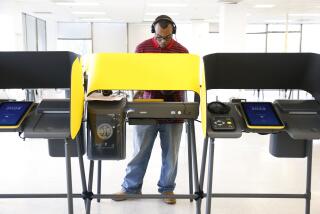Americans Elect: Third-party politics, with a twist
Third parties have generally been marginal players in American politics, especially in presidential elections. But a group called Americans Elect is seeking to rehabilitate the institution with a technological twist. Amid the innovations, however, it is engaging in some old-fashioned political evasion.
As a report by Times staff writer Matea Gold detailed, Americans Elect is seeking to be placed on the ballot throughout the country, including in California, where it has gathered 1.6 million signatures. What is novel about the group is that people who sign up to be “delegates” will choose its presidential nominee in an online convention. It’s an intriguing way to maximize political participation (though it could be subject to fraud and stuffing of the electronic ballot box).
Americans Elect places little faith in traditional political parties. “The only political philosophy we have is that people should be greater than parties,” said Elliot Ackerman, the group’s chief operating officer. In fact, one of the rules of Americans Elect is that its nominees for president and vice president must be of different parties.
The country’s two big political parties are in disfavor now with the public, thanks partly to the obstruction and bombast that have characterized the debate over raising the debt ceiling. But parties have been an indispensable instrument of politics since the beginning of the republic, even though they aren’t mentioned in the Constitution. Even a charismatic third-party candidate would have difficulty winning an election without a traditional party’s support.
Americans Elect may well confound the skeptics about the viability of an independent presidential candidacy. Meanwhile, however, it needs to be transparent about its sources of funding. Though it is seeking recognition as a political party, it is registered as a so-called 501(c)(4), or social welfare organization. Such groups do not have to disclose their donors.
Without any apparent irony, Ackerman said the desire of donors to remain unidentified is “an unfortunate testament to the status of our political landscape that people feel uncomfortable about disclosing the fact that they’re supporting an open nominating process.” For the good-government enthusiasts Ackerman wants to attract, secrecy in the cause of openness will be a hard concept to grasp.
More to Read
A cure for the common opinion
Get thought-provoking perspectives with our weekly newsletter.
You may occasionally receive promotional content from the Los Angeles Times.






